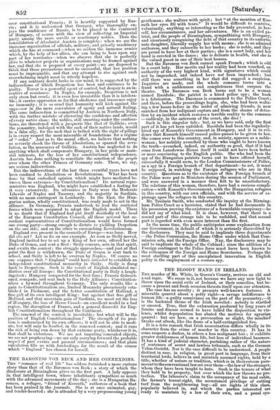THE BARONESS YON BECK AND HER CONNEXIONS. THE " romance of
real life" has seldom furnished a more curious story than that of the Baroness von Beck; a story of which the disclosure at Birmingham gives us the first part. A lady appears in that intelligent town, whose inhabitants sympathize so much with the advanced movements of the day ; she is a Hungarian Ba- roness, a refugee, "friend of Kossuth," authoress of a book that has been praised in the journals. She is at once animated, gay, and tender-hearted ; she is attended by a very prepossessing young gentleman; she waltzes with spirit ; but "at the mention of Kos- suth her eyes fill with tears." It would be difficult to contrive, voluntarily, anything so interesting as the lady presented, in her- self, her circumstances, and her adventures. She is an exiled pa- triot, and the people of Birmingham' sympathizing with Hungary,- and vicariously recognizing the debt of that country to its unfortu- nate daughter, liberally supply her with means; she is an admired authoress and they subscribe to her books ; she i noble, and they are proud to have her at their parties ; she is a court lady, and her hand is coveted in the dance ; she is delicate in health, and she is the valued guest in one of their best houses. But the Baroness von Beek cannot speak French ; which is odd in a court lady. Her merits and her reality had been vouched, on authority of the very highest kind, with signatures which could not be impeached, and indeed have not been impeached ; but still there was something in her that did suggest a suspicion. Inquiries are made, and the whole romance turns into a fraud with a suddenness and completeness that surpass the theatre. The Baroness von Beck turns out to be a woman named Raddula ; the patriot is a hired police spy ; the book is a fabrication. The Baroness is summoned to the Police Court; and there, before the proceedings begin, she, who had been waltz- ing a few hours before in the midst of admiring friends, is now snatched from her indignant captors and from the shame of detec- tion by an incident which restores a terrible reality to the romance —suddenly, in the anteroom of the court, she dies ! Such is this singular tale ; but, as we have said, only the first part of it has yet been unfolded. Raeidula had been the regularly- hired spy of Kossuth's Government in Hungary, and it is in evi- dence that Kossuth himself caused police-passes to be given to her. She comes over to this country, and, in society, appears as a noble- woman ; her nobility avouched by those who ought to have known the truth—avouched, indeed, on authority so good, that if it had come from Lansdowne House itself it could not have been better or more convincing to the English public. She who had been the spy of the Hungarian patriots turns out to have offered herself, successfully it would seem, to the London Commissioners of Police, as a spy in a Foreign branch of that department—to act, it must be supposed, in watching the Foreign refugees who are in this country. Questions as to the existence of this Foreign branch of the Police were put to Ministers during the session of Parliament, and were answered in a manner then felt to be unsatisfactory. The relations of this woman, therefore, have had a curious compli- cation—with Kossuth's Government, with the Hungarian refugees in this country, with our own officials, and with the service of es- pionage upon the refugees in this country.
Mr. Toulmin Smith, who conducted the inquiry at the Birming- ham Police Court as a barrister, stated that he had documents in his possession proving the existence of a formidable conspiracy—he did not say of what kind. It is clear, however, that there is a second part of this strange tale to be unfolded, and that second part is regarded with even more interest than the first.
In the mean time, the public anticipates some explanation from our Government, in default of which it is seriously discredited by the disclosures. They may be said to implicate three departments —the Police Commission, the Home Office under which that Com- mission acts, and the Foreign Office. Nay, the disclosures may be said to implicate the whole of the Cabinet ; since the addition of a Foreign contingent to the Police force must have been known to the colleagues of the Foreign and Home Secretaries. Perhaps the most stealing part of this unexplained innovation in English polity is the employment of a woman spy.


























 Previous page
Previous page